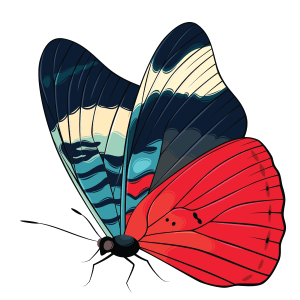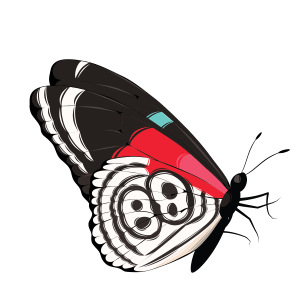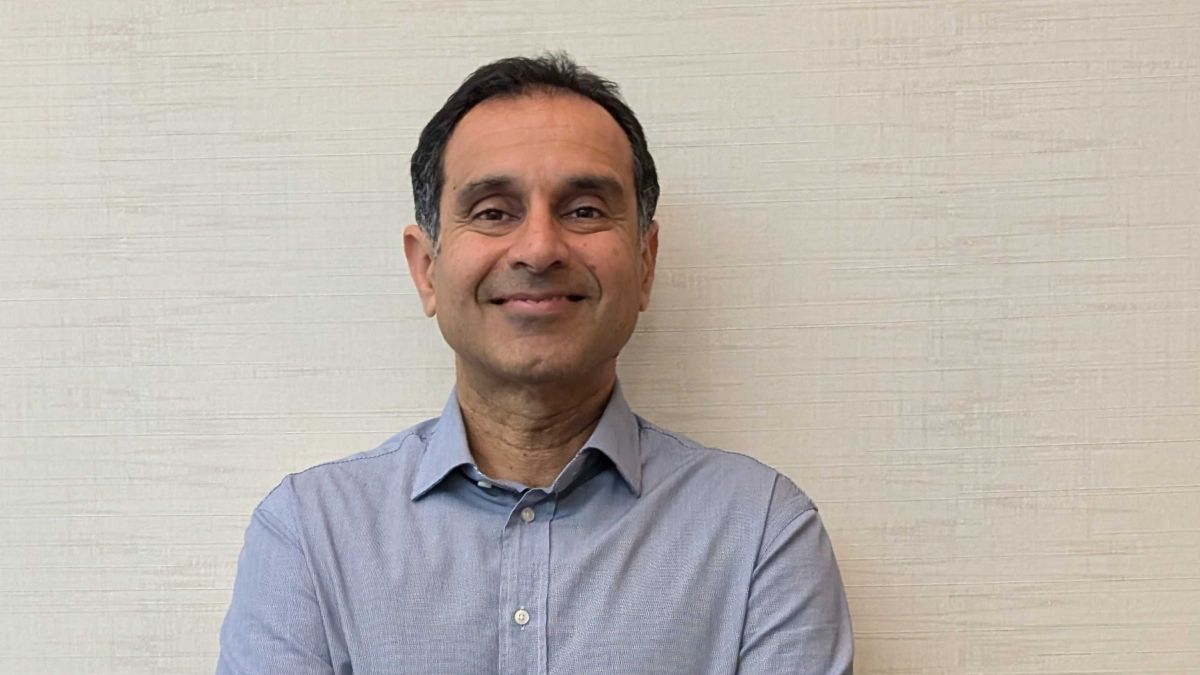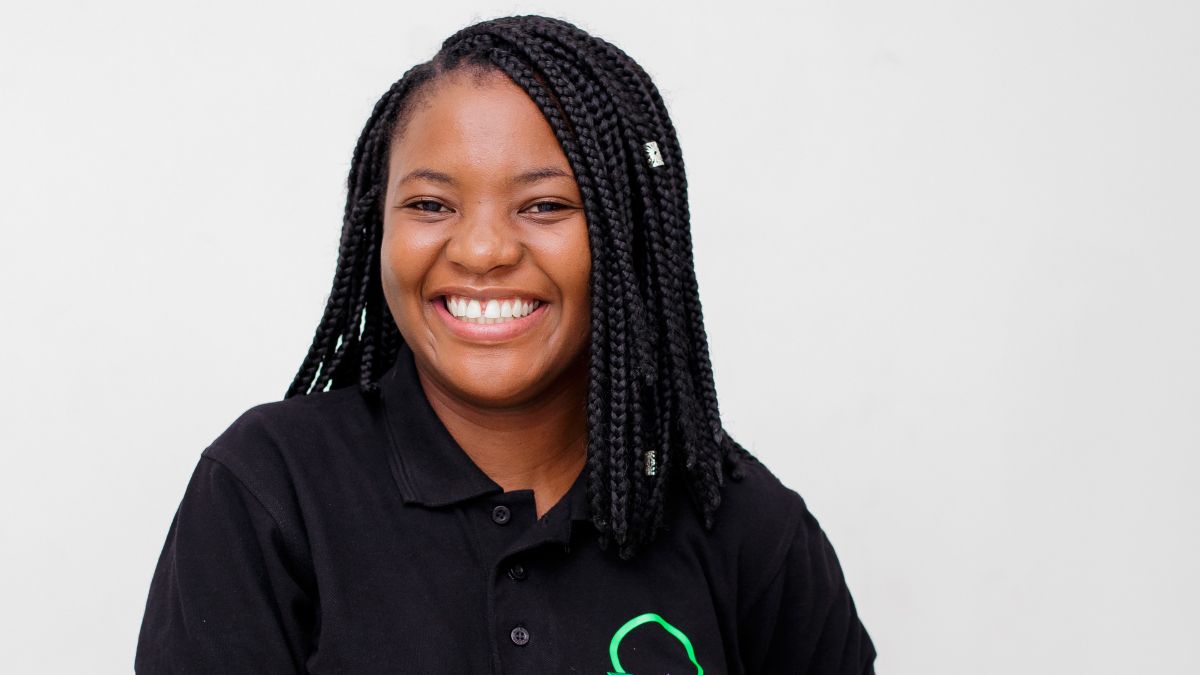November 2024
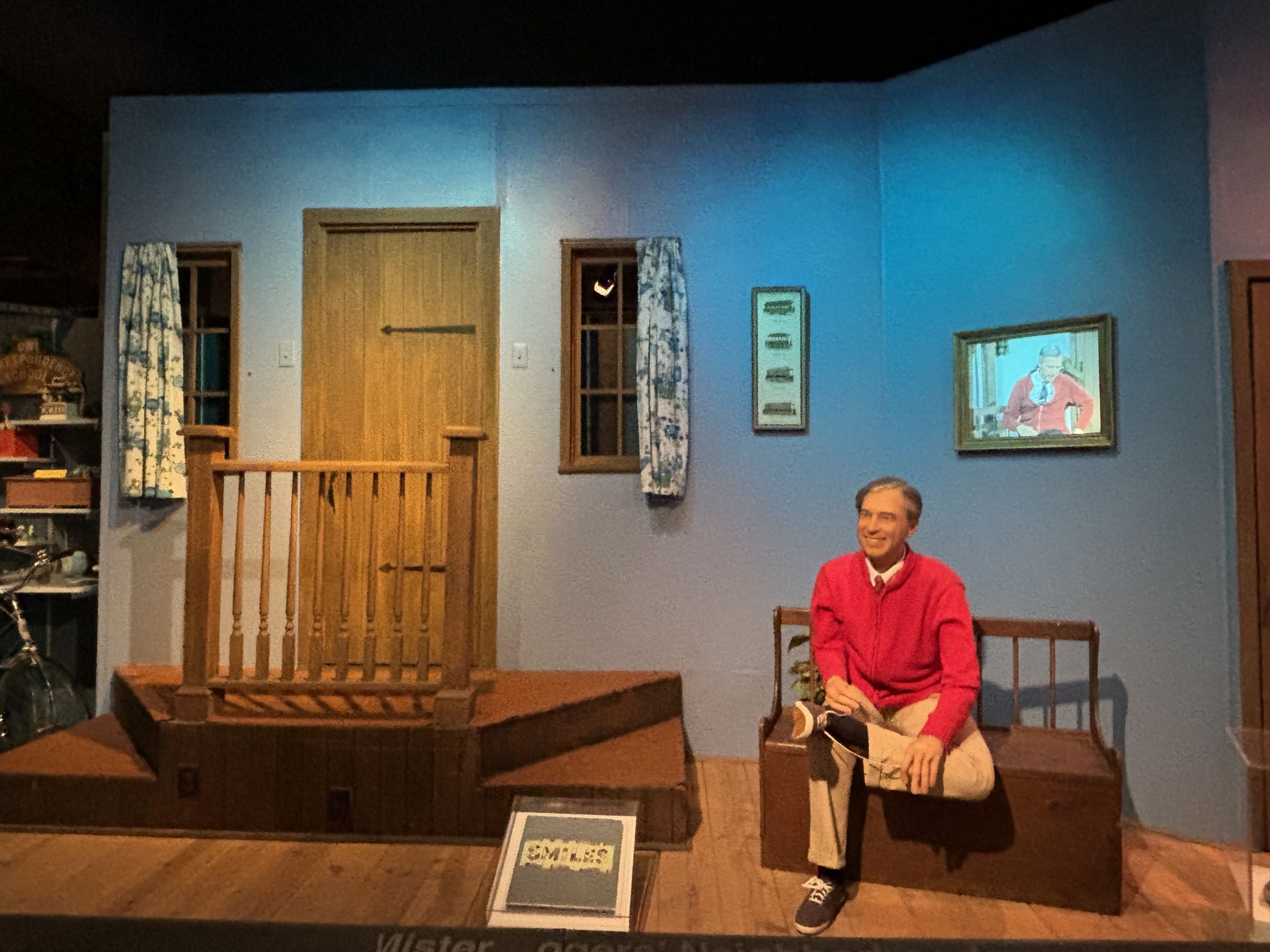
The set of Mister Rogers' Neighborhood is now an exhibit at the Heinz History Museum in Pittsburgh, Pennsylvania. Photo credit: Sarah Bodor
Effective education doesn't happen accidentally. Fred Rogers, beloved educator, television personality, and friend to millions through the TV screen, knew this. His thoughtful approach to Mister Rogers' Neighborhood was grounded in science, pedagogy, and a deep understanding of children’s emotional and intellectual needs. In this episode of The World We Want: The NAAEE Podcast, Gregg Behr and Ryan Rydzewski invite us into The Neighborhood and Mister Rogers’ meticulous method for inspiring curiosity and wonder, key states of mind for fostering learning in environmental education.
From using digital tools and hands-on classroom activities to simply saying, "I noticed you were wondering about...," educators today are able to spark the same sense of discovery Mister Rogers instilled across generations.
Gregg and Ryan discuss how Fred's influence extends beyond the screen into their own lives as parents, shaping their approach to raising children with an emphasis on wonder and intentionality. This heartfelt conversation reminds us that Fred's legacy is alive both in the lessons he taught and in the way his approach to care, curiosity, and kindness continue to inspire families and educators alike.
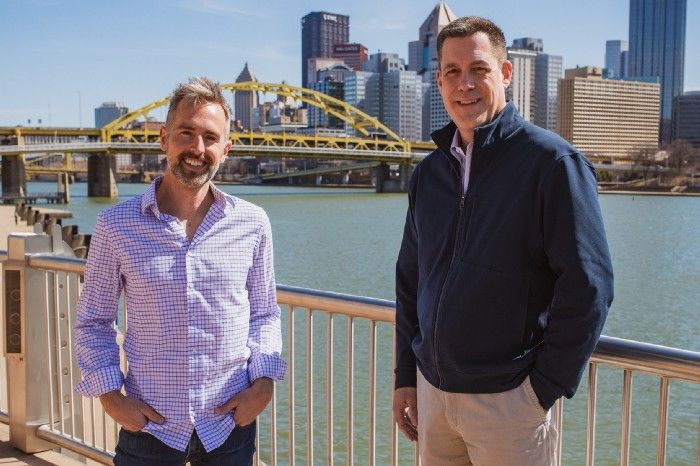
"They were asking questions like, how do we make sure kids feel safe? How do we make sure that they know somebody out there cares about them? How do we make sure that they feel, as Fred used to say, loved and capable of loving? And, you know, once we started hearing that, and especially as a former teacher, I looked at it and I thought—this was everything that was missing from my own classroom."
"What Fred was doing in the program Mister Rogers Neighborhood in many ways mirrors what learning scientists are saying today. So just take that song–when you wonder, you're learning ("Did You Know"). Fred wrote that song in 1968. There are research papers today that say when we're curious, in other words, when we're wondering, something switches on in the brain. Your brain starts to take in information.
So not only are you more likely to learn what it is you're wondering about, your brain starts to take in all sorts of other information, too. Researchers say it's like a vortex. It sucks in what you're curious about and also everything around it. So in a very real sense, Mister Rogers was right. When you wonder, you are learning."
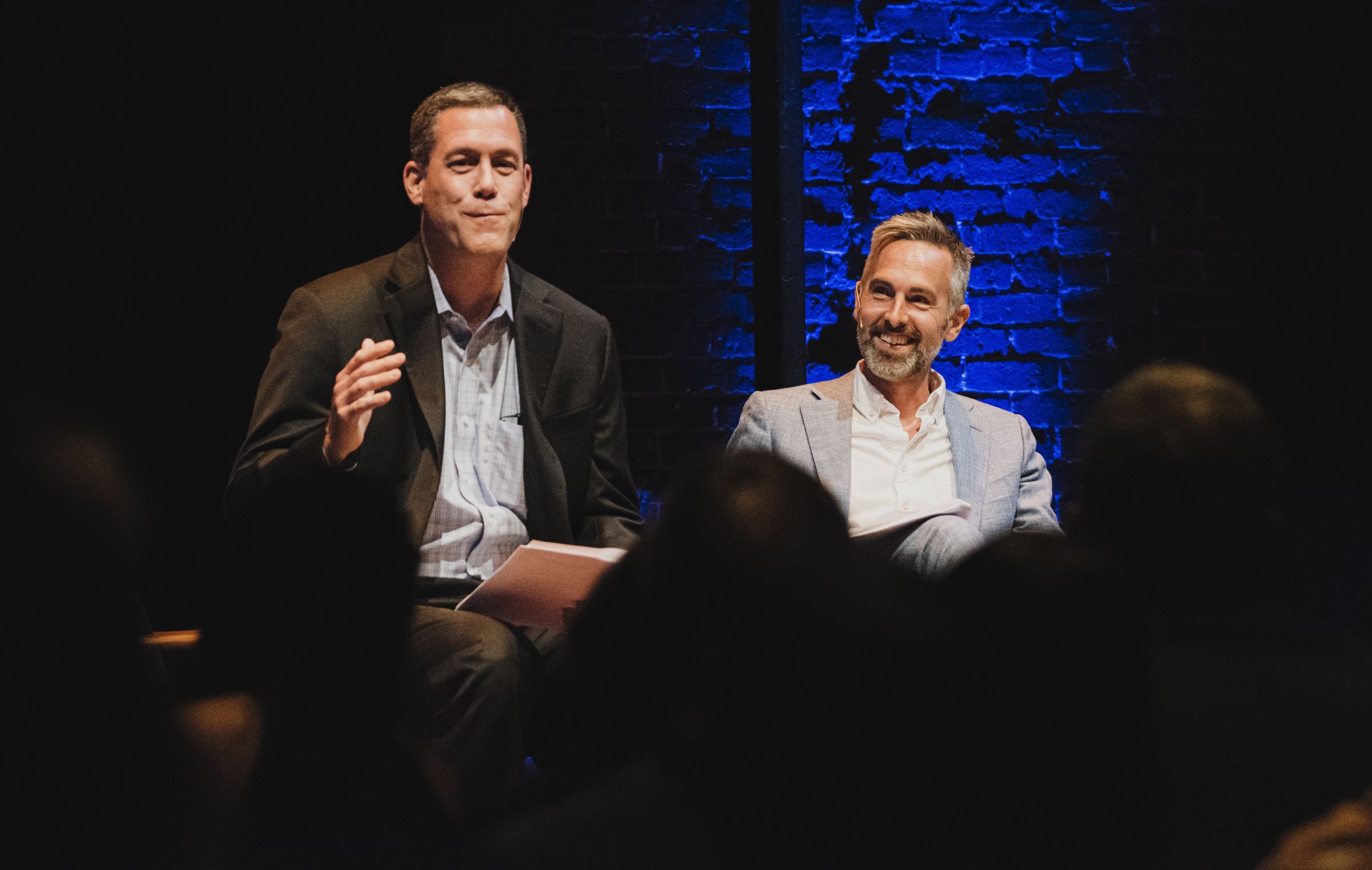
Today's learning science supports what Fred Rogers so delicately and intentionally taught us—that curiosity transforms the brain into a powerful learning machine. In this episode, Gregg and Ryan reveal how Mister Rogers’ timeless methods nurture generations of learners who seek to understand the world around them.
Gregg Behr
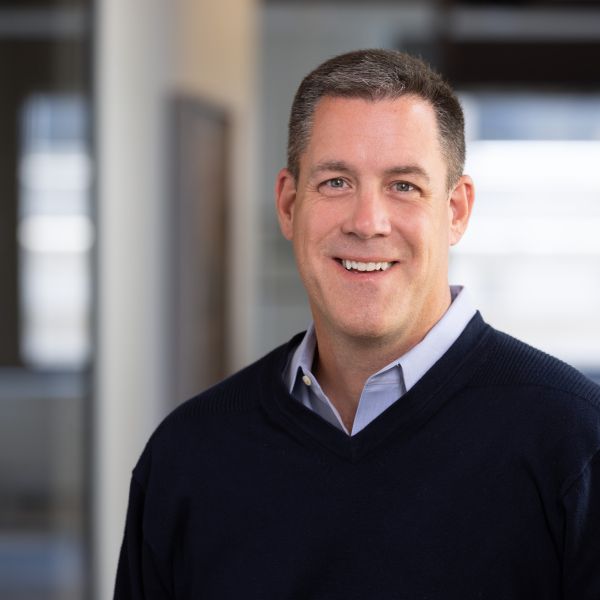
Ryan Rydzewski
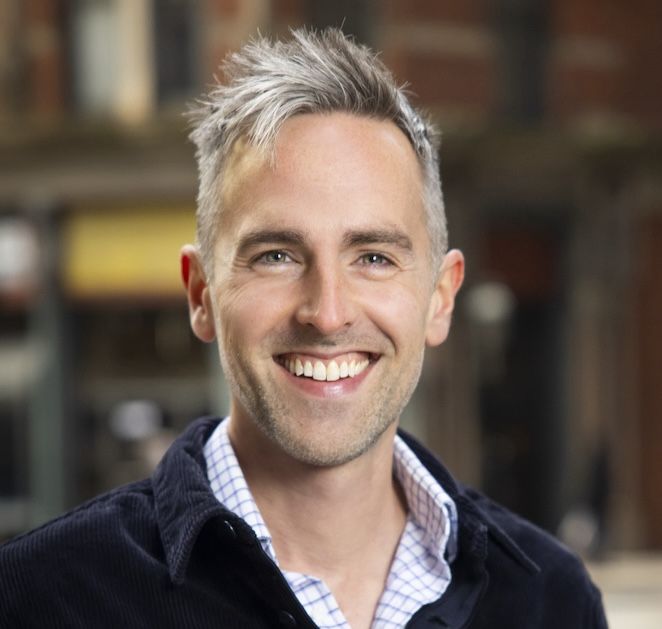
About the Guest Speakers: Gregg Behr and Ryan Rydzewski
Gregg Behr is a father, children’s advocate, thought leader, and the executive director of The Grable Foundation since 2006. As the founder of Remake Learning, he has fostered a globally recognized network that inspires curiosity, creativity, and belonging in education. Gregg advises The Brookings Institution and The Fred Rogers Institute and his work has been celebrated by President Obama, the Disruptor Foundation, ISTE, and AASA for advancing justice, joy, and innovation in learning spaces worldwide.
Ryan Rydzewski is an award-winning author and speaker. A former elementary school teacher, he holds an MFA in nonfiction writing from Chatham University. As an experienced reporter specializing in science and education, Ryan’s work explores topics ranging from schools and space travel to Mister Rogers’ Neighborhood, and he leads workshops for both educators and parents. Originally from Erie, Pennsylvania, he now lives in Pittsburgh with his wife and children.
Gregg and Ryan are coauthors of the book When You Wonder, You're Learning: Mister Rogers' Enduring Lessons for Raising Creative, Curious, Caring Kids. This guide explores the timeless lessons of Mister Rogers' Neighborhood, revealing how curiosity, creativity, and collaboration foster children’s well-being and academic success. Rooted in science and enriched with insights from experts, the authors show parents and educators how to apply Fred Rogers’ “tools for learning” to help kids thrive in the digital age.
Learn more about Gregg and Ryan's work at whenyouwonder.org and by visiting remakelearning.org/wonder.
Explore how kids and their parents can excel at what Mister Rogers taught best—being human—by engaging with Gregg, Ryan, and the When You Wonder community. You can find them at:
Instagram: When_You_Wonder
Facebook: facebook.com/WhenYouWonder
Hear more from Gregg and Ryan on their podcast Remaking Tomorrow.
Transcript
00;00;00;22 - 00;00;22;20
Carrie Albright, Producer
Thanks for tuning into The World We Want: The NAAEE Podcast! Today's episode was recorded in person at the NAAEE 53rd Annual Conference in early November 2024.
00;00;22;22 - 00;00;49;24
Gerry Ellis, Host
Welcome to The World We Want: The NAAEE Podcast. Hi. I'm your host, Gerry Ellis. So what is the world you want? For me, I want a world where we approach each other and our planet with curiosity and courage–to step into the unknown, while having the strength that enables us to be vulnerable on that journey. And that's what's so remarkable about us humans.
00;00;49;27 - 00;00;56;27
Gerry Ellis, Host
It's our willingness to optimistically take on the challenges of a complex world.
00;00;57;00 - 00;01;16;24
Gregg Behr, Guest
He didn't avoid talking about racism. He didn't avoid talking about war. He didn't avoid talking about divorce. He knew that kids, even young kids, have big, complicated feelings, and they bring their big, complicated selves to every scenario. And so he wouldn't have avoided the subject matter.
00;01;16;27 - 00;01;51;28
Gerry Ellis, Host
He, he was Fred Rogers beloved host of the groundbreaking U.S. television series Mister Rogers Neighborhood, where children learned the power of kindness, curiosity and compassion. On this episode, our guests are two men who have spent decades learning about, and maybe more significantly, from Mister Rogers, children's advocate Greg Behr, and award-winning reporter Ryan Rydzewski are authors of When You Wander Your Learning, Mister Rogers Enduring Lessons for Raising Creative, Curious, Caring Kids.
00;01;52;01 - 00;02;18;17
Gerry Ellis, Host
Their book reveals the science behind the iconic television program and the skills and mindset that scientists now consider essential. What Fred Rogers called the “tools for learning.” Thanks for joining us on The World We Want podcast, where we talked to some of the great thinkers, creators, educators and conservationists, as well as some of the newest voices driving change from around the world.
00;02;18;19 - 00;02;43;04
Gerry Ellis, Host
Our conversations are about the world they want and how they are working to build the world we all want, and what do they share in common? Environmental education. One of the most powerful tools for creating a more just and sustainable world. It inspires it enlightens. It influences attitudes. And most importantly, it drives us to become stewards of this planet.
00;02;43;06 - 00;03;23;13
Gerry Ellis, Host
So join me as Greg and Ryan take us on a five decades journey, a legacy of learning to discover how one man did what no one else had done, helped children and many grown ups explore our complex world with curiosity, creativity and collaboration, and most importantly, kindness. To create a world we all want. But before I jump into my conversation with Greg and Ryan, if you're new to the podcast or to environmental education in general, you should know that The World We Want podcast is a production of the of the North American Association for Environmental Education.
00;03;23;15 - 00;03;27;02
Gerry Ellis, Host
Ryan. Greg. Welcome to The World We Want. It's great to have you both with us.
00;03;27;07 - 00;03;29;03
Ryan Rydzewski, Guest
Thanks for having us. We're really excited to be here.
00;03;29;03 - 00;03;31;05
Gregg Behr, Guest
Yeah. What other podcast would we want to be on? Right.
00;03;31;07 - 00;03;43;08
Gerry Ellis, Host
Well, you have your own podcast. I assume you want to be on that podcast. Tell me a little bit about why you're connected to Fred Rogers and why you're connected to early childhood learning.
00;03;43;08 - 00;03;43;16
Ryan Rydzewski, Guest
You want to start, Greg?
00;03;43;16 - 00;04;14;27
Gregg Behr, Guest
Sure. Well, I'm connected to Fred because I'm from Pittsburgh, which is a reminder that Fred Rogers was born just an hour east of Pittsburgh and recorded the iconic television show Mister Rogers Neighborhood right here at WQED television, America's first public television station. And I suppose my Fred days started when I was a kid, right? I was there six, seven, eight years old, sitting in the den, oftentimes with my brother, sometimes with my mom, watching Mister Rogers Neighborhood.
00;04;14;27 - 00;04;51;22
Gregg Behr, Guest
And it was a core part of my childhood. Fast forward decades. I moved back to Pittsburgh as a young professional, and I had occasion to meet Fred Rogers and then to get to know his wife, Joanne Rogers, quite well during the last 20 plus years of her life. And I work in the field of education, particularly in the field of education, philanthropy, a space in which I've worked for 20 years now, supporting teachers and museum exhibit directors and librarians, and all of those caring adults that support creative learning opportunities for kids in and out of school.
00;04;51;28 - 00;05;14;26
Gregg Behr, Guest
And, in the course of that work, my colleague here, Ryan, and I get a chance to read a lot to understand what's happening and learning. How can we make learning experiences better for kids? And it was about almost ten years ago now that we had an aha moment because here we are in Pittsburgh, a place that we think about Fred Rogers, the way that we think about the Pittsburgh Steelers and French fries on our sandwiches.
00;05;14;26 - 00;05;38;26
Gregg Behr, Guest
Right. Like, Fred is just part of the water and we have an emotional connection to him. But what we began to realize as we are reading literature about learning, coming from learning scientists right here in our own backyard at Carnegie Mellon University or the University of Pittsburgh, or for places around the country, is that learning scientists, as they were talking about learning and what we need to do for kids, were writing papers that increasingly to us read like scripts from Mister Rogers’ Neighborhood.
00;05;38;28 - 00;05;57;15
Gregg Behr, Guest
And that was our light bulb, right? Like, we're like, was Fred, could we represent Fred as a learning scientist? Was he one? How did he prepare his work? How did he do what he did? And what are the connections we could draw between today's learning science and what Fred was doing more than a half a century ago?
00;05;57;18 - 00;06;17;02
Gregg Behr, Guest
And lo and behold, digging into the research, digging into the archives at Saint Vincent College, at the Fred Rogers Institute, talking with so many of his still living colleagues, we realized there's a story to tell about Fred that goes beyond that emotional connection, beyond that red sweater that all of us remember so well.
00;06;17;03 - 00;06;37;08
Ryan Rydzewski, Guest
And I remember the first time I went to a learning science conference, and I think I expected something very different than what I experienced. I'm a former teacher, so I thought I was going to go in and hear lots of nuts and bolts sort of pedagogical stuff, lots of charts and graphs. And you know, what these scientists were talking about is exactly what Greg just explained.
00;06;37;08 - 00;06;56;12
Ryan Rydzewski, Guest
They were asking questions like, how do we make sure kids feel safe? How do we make sure that they know somebody out there cares about them? How do we make sure that they feel, as Fred used to say, loved and capable of loving? And, you know, once we started hearing that, and especially as a former teacher, I looked at it and I thought this was everything that was missing from my own classroom.
00;06;56;19 - 00;07;19;08
Ryan Rydzewski, Guest
We don't always think of Fred Rogers as an educator, someone who we can continue to learn from today. Now, of course, he is the nice guy and as in the sweater that we all remember him as, but there's so much more that we can continue to learn from Fred and many of the people who he worked with, many of whom are still, creating programming and children's media and, and working in education today.
00;07;19;10 - 00;07;34;19
Ryan Rydzewski, Guest
So he's got this incredible legacy, not only as a television creator and a television host, but as an educator. And, he left us as his wife Joanne wrote in the foreword to our book, the blueprints for what modern learning can and ought to look like.
00;07;34;21 - 00;07;48;17
Gerry Ellis, Host
I want to get into that book and in a short bit. So then how did you two connect it? Where did that link come that you end up sitting here talking to us?
00;07;48;19 - 00;08;11;24
Ryan Rydzewski, Guest
It was actually in a hotel. Not unlike this one. Just actually, around the block from where we're sitting. And, we got to talking about writing and about, our work and about Mister Rogers, of all people. We started working together. That was probably in 2013, 2014, on all sorts of things.
00;08;11;24 - 00;08;35;08
Ryan Rydzewski, Guest
Like Greg said, we work in education philanthropy. So we were researching and writing about things like playgrounds, things like, what might technology, responsible technology use look like in classrooms, that sort of thing. And we realized, you know, after a while we built up this pretty substantial body of work, all of which could be tied back to the lessons that Fred Rogers left for us.
00;08;35;08 - 00;08;40;24
Ryan Rydzewski, Guest
And I remember Greg saying, we should write a book. And I thought, we're never going to do that.
00;08;40;26 - 00;09;02;15
Gregg Behr, Guest
Yeah, well, let me go back. Let me go back to where it starts in many ways, because, you know, life connected us. Yeah. I found in Ryan someone whose words seem to match my own words. And at the time, I was pressed at work and I had been given the honor and invited to give a talk at West Virginia University as the commencement speaker for the School of Education.
00;09;02;18 - 00;09;04;12
Ryan Rydzewski, Guest
I intentionally didn't tell this story, by the way.
00;09;04;12 - 00;09;15;01
Gregg Behr, Guest
And I turned to Ryan and said, I'd like to give a talk that somehow integrates great learning with John Denver's “Country Roads” and a Fred Rogers’ sensibility.
00;09;15;02 - 00;09;43;15
Ryan Rydzewski, Guest
And I walked out of that meeting thinking, I'm never going to write again. Why did I go into this? I should have been an accountant. I don't even begin to understand how this is going to work. And, you know, we worked on that speech for a while, and we pulled it off. And we realized in doing that that I think we started to unravel many of the threads that later became, when you wonder, you're learning that that sensibility of looking to Fred as, somebody who left us the blueprints for learning and in many ways for life.
00;09;43;18 - 00;09;45;10
Gregg Behr, Guest
And it was a really good talk.
00;09;45;10 - 00;09;49;12
Ryan Rydzewski, Guest
I think so. I didn't give it, but I watched it virtually and applauded.
00;09;49;15 - 00;10;03;12
Gerry Ellis, Host
You know, it's sometimes it's those talks that you come into and you're just like, I don't know if this is ever going to work. And, but they often resonate with people in a way in which you never could have imagined.
00;10;03;15 - 00;10;12;03
Gregg Behr, Guest
And isn't that where sparks and innovation happens? It's in those complementary things that are familiar to us and we just think, what happens? How might we put these things together?
00;10;12;03 - 00;10;27;28
Gerry Ellis, Host
Well, and we always talk about those moments, right? You know that that motivate us all in life. And most of the time, yeah. It's you might know something, you might be a little prepared, but it really comes at you out of the blue and, and catches you off I think.
00;10;27;28 - 00;10;49;13
Ryan Rydzewski, Guest
Yeah. When you're taking a risk and that talk and this idea was definitely taking a risk. And you know I think it makes you feel more alive to your work when you're not quite sure how it's going to land or if it's even going to work. But the more of those risks you take, the more you open yourself up to those aha moments, and those aha moments can become something really, really big and important.
00;10;49;13 - 00;11;07;04
Gregg Behr, Guest
And it was a little bit of a risk presenting representing Fred Rogers as a scientist. Absolutely right. Like here's an emotionally loved person, part of core memories and representing them as what could have been perceived as a staid, you know, rule-bound scientist.
00;11;07;06 - 00;11;25;27
Ryan Rydzewski, Guest
In the background of all this, as we're discussing and thinking about what this book might look like, was this incredible resurgence of Fred Rogers in our culture. So we had a biography come out. We had Max King's biography, we had Morgan Neville's amazing documentary, and then we had just found out Tom Hanks was going to play Mister Rogers.
00;11;25;27 - 00;11;48;13
Ryan Rydzewski, Guest
And so we're talking about this, with the backdrop of suddenly everyone's talking about Fred again. And I think there was an enormous sense of responsibility and for me at least, anxiety. How do we possibly write a book that lives up to the legacy of somebody who so many people love, and how people have so many strong feelings about?
00;11;48;15 - 00;12;10;11
Ryan Rydzewski, Guest
There's a story I think, it might have actually been in this hotel, of Tom Hanks going up the elevator, and then some random person gets on and sees you standing in the elevator with Tom Hanks, and instead of being starstruck and saying, oh my gosh, Mr. Hanks, I'm a huge fan. The person said, hey, I know you're in town to play Mister Rogers, and I want you to know that we take him really seriously in Pittsburgh, so you better not screw it up.
00;12;10;14 - 00;12;19;15
Ryan Rydzewski, Guest
So, like, that's the kind of person Fred is to us. And so, it was having the permission and the encouragement of Joanne Rogers that I think really got this off the ground.
00;12;19;20 - 00;12;24;02
Gregg Behr, Guest
Yeah. That was one of the first two phone calls we made before we even pursued this idea.
00;12;24;05 - 00;12;44;21
Gerry Ellis, Host
The scientist part. And I wonder if you take somebody who's so beloved and is and came across as so gentle and caring. I guess where I'm going with that is if you present him as a scientist and he thought about these things scientifically, was he manipulating people? Was that whole persona of the sweater and being gentle and nice?
00;12;44;21 - 00;12;49;00
Gerry Ellis, Host
Was that just a manipulation of all of us?
00;12;49;03 - 00;13;14;04
Ryan Rydzewski, Guest
Yeah. I think one of the major fears at the beginning was, you know, are we going to spoil the magic, right, by deconstructing what Fred did and trying to reveal the methods? It's almost like a magician doesn't reveal his or her tricks. Right? I think the effect, though, I was worried that if we reveal all this to an audience, people aren't going to see him as Fred, as this special person who he very much was.
00;13;14;06 - 00;13;47;06
Ryan Rydzewski, Guest
But I think for us the effect was the opposite, because when you realize how much intention and research went into every moment of this television program, you can pick any scene from almost 900 episodes. And if you understand the learning science, you can say, oh, Fred's doing that because you know, X, Y is the reason. And then you realize that Fred did that for every scene for almost 900 episodes for more than three decades, and you realize the sheer amount of effort and intention and will that went into what he did and in our eyes
00;13;47;08 - 00;14;14;27
Ryan Rydzewski, Guest
I think it only made him more impressive that somebody with an amazing team, to be sure, was able to sustain that kind of effort for so long because, you know, as he used to say, he wanted to give the best he could and he really, really did. He never winged it in fact, there was a story when Fred was helping another team get a children's television program off the ground and somebody said, you know, there were we're going back and forth on a really difficult scene and someone said, yeah, it's for kids who cares.
00;14;14;27 - 00;14;35;21
Ryan Rydzewski, Guest
Let's just do it and go. And Fred said, absolutely not, because it's for children. This has to, we have to get it right. And Fred got it right for decades. And he could only do that through turning to science and turning to experts and being absolutely intentional and deliberate about every decision, no matter how small it might have seemed.
00;14;35;24 - 00;14;40;08
Gerry Ellis, Host
How intuitive do you think it was in the beginning?
00;14;40;11 - 00;15;08;05
Gregg Behr, Guest
No, it wasn't intuitive at all. And in fact, that harkens back to your previous question about which I've been over here puzzling because we've never been asked that question. Right. And as I think about your question, we've never gotten into the whole of science-good, science-bad, right. Because while we present Fred Rogers as a modern-day learning scientist, we're still talking about Fred Rogers, who had a scientific like preparation for his work.
00;15;08;08 - 00;15;38;17
Gregg Behr, Guest
And Ryan used the verb deconstructed. So as we deconstruct how did Fred do what he did? What we can do is tell a story about a young man who's preparing for his livelihood, something to which any of us can relate and there he is, studying at the University of Pittsburgh. He's studying at the Pittsburgh Theological Seminary, and he decides that he wants to use this technology that he knows is so attractive to kids, the technology of television.
00;15;38;19 - 00;16;20;00
Gregg Behr, Guest
And he said, how do I make what's attractive good? And when he decided he wanted to, essentially take that technology and minister with it, his teachers there said, well, Fred, you better learn something about child development theory and practice. And that's the part of the story that was so then illuminating for me and Ryan, and I think illuminating for all of us as adults, because we can picture Fred as the student who's then studying with folks at a place called Arsenal Family and Children's Center here in Pittsburgh and still operating right, and studying with the likes of Co-founder's Doctor Benjamin Spock and Margaret McFarland, and then having the opportunity to study with Eric
00;16;20;00 - 00;16;47;20
Gregg Behr, Guest
Erickson and other child development practitioners and psychiatrists and psychologists and masters of their time, and absorbing all of that. And then years later, we see that science in the most seamless ways possible. Well, we don't notice it unless it's pointed out to us because it is so seamless. The ways in which that science comes through that harkens back to his time studying with Spock and Margaret McFarland and others.
00;16;47;20 - 00;16;53;22
Gregg Behr, Guest
So in so many ways, Fred's work wasn't intuitive. It was very planful, very deliberate, very intentional.
00;16;53;25 - 00;17;20;05
Ryan Rydzewski, Guest
We sometimes joke that he was he was almost too good at it. I mean, it's really the science is so well blended with art and with stories and songs. And Fred wrote like 13 operas and 200 songs and all of this, if you look at it closely and you understand the learning science he was using, you can again see what kinds of decisions he was making in every song, every opera, every piece of clothing he put on.
00;17;20;05 - 00;17;43;14
Ryan Rydzewski, Guest
And there were times where, you know, this could be incredibly frustrating. As you might imagine, you're trying to create a television program and everything has to be based in some sort of intention. There were times when Fred would stop in the middle of the shoot, which is extraordinarily expensive to do at the time, and he would just walk up the street from where they were filming to the University of Pittsburgh, where his mentor, Doctor Margaret McFarland, was a psychiatrist and, you know, lifelong friend.
00;17;43;16 - 00;18;01;18
Ryan Rydzewski, Guest
And he would sit down with her and he'd say, we're struggling with, should we call this episode “Little and Big” or “Big and Little?” And they would talk about it, and then Fred would walk back down to the studio. They would reshoot once he knew he had the scientifically grounded answer, and then they would go on. It's just, it's kind of incredible how closely he was paying attention.
00;18;01;21 - 00;18;22;01
Gerry Ellis, Host
So that's what I'm fascinated by with Fred is it's a storytelling piece of it, which you were mentioning, whether it's an opera or whatever it is, it's storytelling. If he was doing that show now and it was about environmental education, that was the core of how would he approach that do you think?
00;18;22;04 - 00;18;45;04
Gregg Behr, Guest
If your listeners could see our eyes right when we step back? Because we would never want to step in and pretend to know what Fred would do here at this very moment. But what we can do is look at his work and notice that he didn't avoid hard subjects. He didn't avoid talking about racism. He didn't avoid talking about war.
00;18;45;04 - 00;19;11;26
Gregg Behr, Guest
He didn't avoid talking about divorce. He knew that kids, even young kids, have big, complicated feelings. And they bring their big complex selves to every scenario. And so he wouldn't have avoided the subject matter. And I suppose at best we can look at discrete programs or an entire week that he did in, I believe it's in the early 90s all around environmental education.
00;19;11;26 - 00;19;21;14
Gregg Behr, Guest
So there are probably lessons to learn from what did he actually did? But I think most importantly is he wouldn't have avoided it. He wouldn't have avoided it.
00;19;21;17 - 00;19;43;04
Ryan Rydzewski, Guest
Yeah. And you know, one thing that I've been thinking about a lot recently, so, for our listeners, we're recording this on Election Day. You know, there are a lot of fraught political topics on the table right now, to put it mildly. Climate change is certainly one of them. And Fred had this way of communicating that was incredibly bridging.
00;19;43;06 - 00;20;02;29
Ryan Rydzewski, Guest
And he used to say that people don't, you know, you don't change people's minds by pointing a finger at them. You people only change in relation to somebody who loves them. And you can see that love pervading everything that Fred did. And you know, you could criticize that, that, you know, approach and say, well, you know, some people need to have a finger wagged in their face.
00;20;02;29 - 00;20;27;24
Ryan Rydzewski, Guest
And maybe that's true, but it also remains true that from everything we know about human psychology and motivation and how you might change people's mind, it always starts from a place of love. And, far from being sort of wishy washy or both sides-ish, I think that that's an incredibly brave way to approach things like climate change to, to start with love, to refuse to judge someone.
00;20;27;27 - 00;20;42;23
Ryan Rydzewski, Guest
And if you want to bring them around to believing whatever it is that you believe, you have to come to them from a place of fellowship, from a place of respect, from a place of of deep listening and loving speech. And we see that again and again in the neighborhood.
00;20;42;25 - 00;20;49;24
Gregg Behr, Guest
And to paraphrase Fred, anything that's mentionable is manageable.
00;20;49;27 - 00;21;17;21
Carrie Albright, Producer
Hi everyone. I'm Carrie Albright from NAAEE. Thanks for tuning in to The World We Want: the NAAEE Podcast and learning more about the educator, scientist, and friend that was Mister Rogers. In just a minute. We'll hear more from Ryan and Greg on how Mister Rogers’ practices have since been adopted in classrooms, research, and households. The World We Want is a project of the North American Association for Environmental Education.
00;21;17;24 - 00;21;44;19
Carrie Albright, Producer
We share the stories of change makers and educators who are working to create a more just and sustainable future. Be a part of that change. Visit our website naaee.org to see what's happening across the country and the world through this environmental education network. If you're enjoying what you're hearing, please consider adding a rating, a review, or subscribing wherever you listen to your favorite podcasts.
00;21;44;21 - 00;22;13;25
Carrie Albright, Producer
And if you know someone who might benefit from a little of Mister Rogers’ messaging to please share this episode with them and you can find me on Facebook, Instagram, LinkedIn, and YouTube. Now back to Gerry, Greg and Ryan to hear more about how Mister Rogers’ legacy of magic and science lives on nurturing the curiosity and care of children, adults and educators alike.
00;22;13;27 - 00;22;37;05
Gerry Ellis, Host
What's interesting is we seem to divide the science from the human being, and that's what I'm hearing from you guys about Fred is he combined those two. And I think about what Fred Rogers did on that show. And if you just took that show and he walked outside, the impact that would have on children.
00;22;37;08 - 00;22;56;19
Ryan Rydzewski, Guest
One of our favorite days in researching When You Wonder You’re Learning was going to visit the Fred Rogers archive in Latrobe, which is where Fred was born. They still housed all of his papers there. So if you walk into this, this office, this archive, it's just sort of a bland office room. You know, fluorescent lighting and lots and lots of boxes.
00;22;56;19 - 00;23;21;26
Ryan Rydzewski, Guest
But in those boxes are 50 years worth of correspondence to Fred, from kids, from their parents, from their teachers, from adults who just were thanking Fred for being a presence in their lives. And what's amazing is that Fred responded to every letter he got. So if you're listeners of you wrote a letter to Mister Rogers, you can probably go find it in the Fred Rogers Archive and you can see in the margins of these letters, Fred making notes and thinking about how he's going to respond.
00;23;21;26 - 00;23;41;28
Ryan Rydzewski, Guest
And that was our first indication that the neighborhood, even though television is a one way medium, Fred talking to us, he also made it a conversation. He was listening. He was out there walking on the land, metaphorically speaking. He knew what was on his listeners mind, and you could draw a direct through line between what their concerns were, and they would share some heartbreaking concerns.
00;23;41;28 - 00;23;55;15
Ryan Rydzewski, Guest
As you can imagine with Fred in these letters, with what he is then talking about and how he's talking about it in Mister Rogers Neighborhood. He was very much, a listener as much as he was, a presence on the television screen.
00;23;55;17 - 00;24;19;27
Gregg Behr, Guest
Well, and among other things, when he thought about connecting with people, he always reminded himself and his viewers to start in a familiar place. Right. So if we were instead at a conference with machinists who wanted to show us how things are built and made, right, I could imagine those machinists wanting to, like, pull out the parts and talk about the mechanical engineering and what's happening.
00;24;19;27 - 00;24;47;10
Gregg Behr, Guest
And so one of the things that Mister Rogers did when he was trying to connect his viewers to hard or complicated subjects, is that he started in a familiar place. So imagine instead that we're at a conference not about environmental well-being, but a machinist conference. And these machinists want to, like, show us their Harry Potter-like, you know, contraptions and the mechanical engineering behind us behind it all.
00;24;47;10 - 00;25;06;00
Gregg Behr, Guest
And they like they want to take us to that place. Well, that's what Fred did in the very familiar and famous crayon episode where, you know, we go off to the factory and see where the crowns are made. But Fred doesn't start with the loud noises and the gadgets and all of those machines and the whirling labeling of crayons.
00;25;06;06 - 00;25;31;01
Gregg Behr, Guest
He starts very simply with a box of crayons, pulling out a crayon. You can probably imagine that crayon right now. You can smell that crayon right now. You can imagine yourself drawing with that crown. And that's what Fred does. He starts and he pulls out his easel and it just starts drawing. And it's a reminder to start at a place that's familiar, then to take us off to that place of mystery.
00;25;31;03 - 00;25;51;04
Gregg Behr, Guest
And so I can imagine then the folks at this conference involved in this association, yes, we want to get to the hard topics. We want to wrestle with what it is that we can do. And it's a reminder to walk the ground and start where people are. Start with the food that they love. Start with the celebrations that they enjoy.
00;25;51;06 - 00;26;01;22
Gregg Behr, Guest
Start with the things in their own backyard. Take them from that place that's familiar and comfortable. After then the place of mystery that's complex and filled with hard questions.
00;26;01;26 - 00;26;22;15
Ryan Rydzewski, Guest
And that's why I was smiling earlier when you told us the story, Gerry, about talking to someone downstairs about climate change and how it's affecting hops and it's making our beer worse. And the person said, oh my gosh, I've never thought of it that way. So whether it's, you know, beer or a crayon, starting with that place that's familiar or something that we care about already, so that we can then ground ourselves and go on to the hard stuff.
00;26;22;15 - 00;26;24;22
Ryan Rydzewski, Guest
That's a very Fred method, for sure.
00;26;24;24 - 00;26;42;02
Gerry Ellis, Host
Well, that it made me think of your book When You Wonder. And it's funny because it's W-O-N-D-E-R, when you wonder. And I was when I was doing the research, I thought it was W-A-N-D-E-R
00;26;42;04 - 00;26;44;07
Gregg Behr, Guest
And well when we wander, we wonder.
00;26;44;07 - 00;27;01;03
Gerry Ellis, Host
Yes, exactly. And just as you were describing in the story about the crayons, it when we wander off to that place. But we have to we have to wonder about it first. And how did you guys come to the title?
00;27;01;05 - 00;27;29;16
Ryan Rydzewski, Guest
Wish we could take credit. So the title comes from a song that Fred used to sing called Did You Know? And the song says, did you know, did you know when you wonder, you're learning. And, we had a couple working titles for the book, all of which I thought were great. And when our publisher read the first chapter in which we talk about curiosity, we had the wonderful, great fortune to have permission to use some of the lyrics from Fred Rogers Productions.
00;27;29;18 - 00;27;37;27
Ryan Rydzewski, Guest
And they read that line “when you wonder, you're learning”. And they said, this is what your whole book is about. I think this is your title. And, you know, they were right.
00;27;37;29 - 00;27;52;05
Gerry Ellis, Host
Now, I know I love the title, I’d love the steal It. It's like, yeah, it's, you know, I keep collecting for books that I've done in the past, keep collecting think phrases and stuff like that. You think, okay, that's a perfect chapter here.
00;27;52;07 - 00;27;56;29
Gregg Behr, Guest
There are hundreds of Fred songs for you to read and find the perfect title.
00;27;57;01 - 00;28;18;12
Ryan Rydzewski, Guest
And to go back to Greg's point earlier that, you know, what Fred was doing in the program in the Mister Rogers Neighborhood in many ways mirrors what learning scientists are saying today. So just take that song when you wonder you're learning. Fred wrote that song in 1968. There are research papers today that say when we're curious, in other words, when we're wondering, something switches on in the brain.
00;28;18;12 - 00;28;35;12
Ryan Rydzewski, Guest
Your brain starts to take in information. So not only are you more likely to learn what it is you're wondering about your brain starts to take in all sorts of other information. Two researchers say it's like a vortex. It sucks in what you're curious about and also everything around it. So in a very real sense, Mister Rogers was right.
00;28;35;12 - 00;28;44;15
Ryan Rydzewski, Guest
When you wonder, you are learning one of the many ways that Fred was 40, 50 years ahead of his time when it comes to applying the learning sciences.
00;28;44;17 - 00;29;10;04
Gerry Ellis, Host
Well, that's why I a minute ago, I was talking to you about environmental education, and I feel like sometimes we just have edge too far to the science side of it. We've sort of forgotten the wonder, the awe, the magic of it. I wanted to ask you both about your learning, your perspectives. I know digital learning is important to both and like, how does how do we incorporate those things?
00;29;10;04 - 00;29;24;25
Gerry Ellis, Host
How do you see those incorporated in education in general, especially environmental education, since we're here at this conference, how do we incorporate digital learning without making it the path rather than just a tool?
00;29;24;28 - 00;29;50;11
Gregg Behr, Guest
Well, that's the thing. I think you think about it just as a tool, whether it's a smartphone or AR, VR, it's nothing more than fire the fulcrum and the printing press. Right? It is merely a tool that, when used well in developmentally appropriate ways, is something that might ignite a spark, might take you off to a place of mystery, might be a means by which to explore or discover something.
00;29;50;14 - 00;29;59;21
Gregg Behr, Guest
And I think when we just are playing about that, that it's merely a tool, then we don't get caught up in the technological pace of it all.
00;29;59;23 - 00;30;15;25
Ryan Rydzewski, Guest
Yeah. There's, we've talked to somebody in the book named Hedda Sharapan. Hedda was a producer on Mister Rogers Neighborhood, she worked all the way back, with Fred and the very first day of production in the late 1960s, still working in education today, still here in Pittsburgh, still an incredible educator in her own right.
00;30;15;27 - 00;30;25;17
Ryan Rydzewski, Guest
And, you know, we were asking her for examples of Fred-like, things that educators are doing out there in the world. And she gave us this–You want to talk about the ask it basket?
00;30;25;19 - 00;30;27;01
Gregg Behr, Guest
Sure.
00;30;27;03 - 00;30;32;02
Ryan Rydzewski, Guest
We'll come back to digital tools, but it's important to understand what this Ask It Basket is.
00;30;32;04 - 00;30;54;14
Gregg Behr, Guest
So Hedda shares, so we're exploring the concepts of curiosity and some of the elements that go into it. And Hedda shares with us the story of visiting a classroom herself. And she has gone off to see a master teacher do her thing. Right. So she goes to this building, goes into the classroom and walks in and sees a fairly large wicker basket taking up precious real estate.
00;30;54;15 - 00;31;10;09
Gregg Behr, Guest
I say precious because there's so, you know, there's so many things happening in any classroom. We can all imagine it right now. And she's wondering, why is this empty wicker basket taking up space? But she's there to watch a great teacher, so she goes to the back of the classroom and you know what? She sees exactly what she's gone to see.
00;31;10;09 - 00;31;36;27
Gregg Behr, Guest
This teacher is incredible. She's obviously prepared. The kids are asking all sorts of questions. They're engaged. And one of the things that had it begins to notice is that the kids themselves are asking lots of questions. Now, sometimes those questions are right on point because it's designed as part of the instructional plan for that day. And so it's pedagogically important to respond to each student's question as it's asked and Hedda
00;31;36;27 - 00;32;00;10
Gregg Behr, Guest
Begins to notice, too, that some of these questions are coming right out from over the left field wall, like things that were on the kids minds. Maybe they dreamed about it. Maybe it was in their morning conversation, right? It had nothing to do with anything. And it's a reminder that each of us, whether a kid or an adult, bring our full, complicated cells to every situation, to a podcast, to a book, to a dinner, whatever it might be.
00;32;00;13 - 00;32;21;20
Gregg Behr, Guest
The great thing about this teacher is that she acknowledges the question that's been asked, even if it has come out from over the left field wall, she's noticed it physically, writes it down, and then walks over to the ask it basket, which is what that wicker basket is called, puts it in and says later, together, we're going to wonder about the answer or answers to your questions.
00;32;21;23 - 00;32;44;04
Gregg Behr, Guest
Now think about all of the magical things that are happening in that moment. One, that student knows that she's safe in that space, that I have permission to ask the things that are on my mind, for whatever reason, that they might be on my mind. And then I've got a caring adult here nearby me, who's going to help me answer the things that are driving me on this particular day.
00;32;44;12 - 00;32;50;05
Gregg Behr, Guest
That's a special thing. That's an atmosphere that a great learner, a great educator, creates.
00;32;50;08 - 00;33;12;22
Ryan Rydzewski, Guest
So fast forward to today. We have scientists at Carnegie Mellon University, and the Pennsylvania Association for the Education of Young Children working on a digital tool to create a sort of digital ask it basket and they come up with an app called message from me. And this is an app installed on iPads, digital cameras, that are then placed in early learning settings.
00;33;12;22 - 00;33;31;26
Ryan Rydzewski, Guest
So kids throughout the day can take pictures of things that they're wondering about. Maybe it's a fish in the aquarium, maybe it's a classmate, maybe it's a drawing. They can take pictures of the things that make them curious, and they can record a voice message to go with that picture. That picture, that voice message then gets sent to that child's caregiver.
00;33;31;26 - 00;33;46;07
Ryan Rydzewski, Guest
So when mom or dad or grandma, grandpa picks her up at the end of the day, they don't have to just ask, you know, like, hey, what you do at school today? Because we all know where that question tends to land. Yeah, that's what I used to say. And instead they can say, hey, I noticed you were wondering about the blue fish.
00;33;46;09 - 00;34;11;11
Ryan Rydzewski, Guest
What do you wonder about the blue fish? How do you think it lives underwater? What else might we find underwater? It was, it's a very Fred-like, yet digital way of reminding kids that their questions are okay, that they have a caring adult who's going to encourage that sense of curiosity, and that even if those questions are coming out from over the left field wall, someone is out there paying attention to it and encouraging it and going out into the world with them to try to answer it.
00;34;11;14 - 00;34;33;10
Gregg Behr, Guest
So to go back to your question, then, how do we think about digital devices and technology that's now available to us? Well, I think we think about it the way that Fred thought about that newfangled technology of television. He noticed that it was attractive to kids and then said, well, this is attractive. It can be either used for good or ill.
00;34;33;12 - 00;34;45;17
Gregg Behr, Guest
How do I make what's inevitably attractive good? Which is what I think any roboticist, technologist, entrepreneur or teacher is doing with all sorts of modern devices.
00;34;45;22 - 00;35;04;06
Ryan Rydzewski, Guest
And, you know, Fred used to say that the best, most useful time for a television is after it's been turned off, when kids then have time to talk about what they've seen with a trusted adult, to talk about what they wonder and when think about effective digital tools today, I think the same thing applies. Digital tools can get us interested in the world.
00;35;04;06 - 00;35;23;01
Ryan Rydzewski, Guest
They can help take us out into the world virtually. But the best time, the best uses for them are after they've been turned off. When we go back to that relationship that we saw so clearly in Fred Rogers Neighborhood that we felt so clearly when we turn those things off and we can then talk to the people around us about what they made us wonder or what we saw together.
00;35;23;04 - 00;35;25;29
Ryan Rydzewski, Guest
That's where the value of digital tools really lies.
00;35;26;01 - 00;35;28;14
Gerry Ellis, Host
Do both or either of you have children?
00;35;28;18 - 00;35;29;02
Ryan Rydzewski, Guest
We both have.
00;35;29;02 - 00;35;30;03
Gregg Behr, Guest
Two. I'm a girl dad.
00;35;30;04 - 00;35;33;03
Ryan Rydzewski, Guest
My youngest was born nine weeks ago.
00;35;33;05 - 00;35;39;05
Gregg Behr, Guest
So yeah, middle schoolers.
00;35;39;07 - 00;35;52;25
Gerry Ellis, Host
Reference points. The question is, how do you think about these kids and your interaction with raising them differently than you think you would have thought 20 years ago?
00;35;52;27 - 00;36;22;12
Gregg Behr, Guest
There's an incredible hazard to writing a book like this. I think it's given me more pause, maybe introduce more patience into my life, recognizing that I've got to step back and understand why is my daughter bringing her full, complicated self at this moment into this scenario? Right. There's a real mindfulness that I think Fred's teachings have left with me.
00;36;22;14 - 00;36;42;08
Gregg Behr, Guest
I also, I think my wife and I are also much better about seeing the broader landscape as a place where the kids learn, right? Of course they're going to learn at school. Ideally, they're going to learn at home. And how do we think of our city, how do we think of our region as something akin to Mister Rogers' real life neighborhood?
00;36;42;08 - 00;37;07;13
Gregg Behr, Guest
And how do we connect what's happening at school with a museum visit to an after school program, a summer camp? I think we've been much more deliberate and intentional about thinking about the neighborhood, and then also how we expose the kids to that neighborhood and allow them to sample all sorts of experiences so that they might, find unexpected sparks or joys and things that we might not otherwise have introduced them to.
00;37;08;23 - 00;37;29;05
Ryan Rydzewski, Guest
Yeah, I agree with all of that. And I would just add that, you know, when we when we first called Joanne Rogers to ask her about this too, first of all, does this even sound right to you. And is it okay if we write it. And the answer is a resounding yes to both of those. But she said, you know, one thing you don't want to do is portray Fred as a saint, because if you do that, then what he did becomes unattainable, right?
00;37;29;05 - 00;37;52;14
Ryan Rydzewski, Guest
And there was nothing magic about Fred. It came down to science. It came down to his deliberate intention. It came down to his unwillingness to give anything less than his best to the kids who were looking up to him. And I think one of the greatest gifts of this whole multi-year journey is, has been to get to know the people who worked so closely with Fred and get to know the people who made this program.
00;37;52;14 - 00;38;11;22
Ryan Rydzewski, Guest
That means so much to both of us and means so much to our kids as well. I mentioned Hedda Sharapan a few moments ago. The educator who told us about the Ask It Basket just a few days ago, she was at my house. She had knit my baby girl, a new sweater and a knit hat, and she brought over Daniel Tiger figurines for my older son.
00;38;11;22 - 00;38;29;29
Ryan Rydzewski, Guest
And these are people who, in a very real sense, took care of me when I was a kid. And now they are helping to take care of my children. And it's a reminder that they are real people, just like Fred was a real person. And that is incredibly liberating, because it means that all of us can do this because we're all real people too.
00;38;30;01 - 00;38;49;21
Ryan Rydzewski, Guest
But it also adds an enormous sense of responsibility, because we know Fred and his colleagues were only able to do what they did because they were uncompromising. And it's a reminder that I need to be uncompromising as well when it comes to giving my kids and hopefully my neighbors’ kids and Pittsburgh's kids, the absolute best.
00;38;49;24 - 00;38;51;00
Gregg Behr, Guest
But isn't that the hard part?
00;38;51;02 - 00;38;52;04
Ryan Rydzewski, Guest
It's the hardest part, right?
00;38;52;04 - 00;39;19;09
Gregg Behr, Guest
Because we remind ourselves, and as Joanne instructed us, Fred was not a saint. He got mad, he got angry. He was just like you and me. And yet we know how deliberate and intentional he was, how uncompromising he was. And that's maybe the biggest challenge. Do I give enough time, space, thoughtfulness? Do I slow down enough myself to be deliberate and intentional and most days, the answer to that is no.
00;39;19;11 - 00;39;26;21
Ryan Rydzewski, Guest
Yeah, my son's on this new kick where he digs the dirt out of our house plants and dumps it on the floor. And
00;39;26;24 - 00;39;34;16
Ryan Rydzewski, Guest
I’m becoming working on becoming more patient. But, you know, I know he's exploring. And what is he wondering about what's under that dirt?
00;39;34;18 - 00;39;58;00
Gerry Ellis, Host
This is environmental education at its core. This is bringing it home right there. And I do want to ask you one last question, because this is called “The World We Want.” And I think it, Greg, I think it was on your website that I read this and this is actually something that Fred apparently said. Right. “Often when you're at the end of something, you're at the beginning of something.”
00;39;58;00 - 00;40;22;16
Gerry Ellis, Host
And that's exactly where we find ourselves now, what something else will look like is largely up to us. And I thought that was so beautiful because it is what we designed this podcast to be. What is world we want. And that's largely up to us. So I’d love to ask both of you that question, what is the world you want out of this?
00;40;22;16 - 00;40;24;19
Gerry Ellis, Host
That maybe is the world we all want?
00;40;24;21 - 00;40;29;23
Gregg Behr, Guest
It is such a great question, and so much so that I want to hear first from Ryan.
00;40;29;25 - 00;40;59;21
Ryan Rydzewski, Guest
He's stalling. He's trying to think of an answer. It is. I love the question. And it makes me think of, you know, when we were researching this book, George Floyd had just been murdered. Covid was in full swing. There were protests outside our window. You know, it was a, it was a hard time for everybody. And it felt at first it was like, well, you know, is it even responsible to spend this time watching a children's television program?
00;40;59;25 - 00;41;29;21
Ryan Rydzewski, Guest
Right. Is it escapism to just spend all day watching Mister Rogers? And what really shocked us is that, you know, the neighborhood we remember, it is this sort of beautiful, sunny place and it often wasn't. Fred went to some really dark places. He grappled with really difficult issues, as Greg mentioned earlier. And so we were trying to think like, why do we remember the neighborhood so fondly when Fred really portrayed it, you know, the world as it was, rather than the world as he wanted it to be.
00;41;29;23 - 00;41;51;15
Ryan Rydzewski, Guest
And it makes me think of a quote from Mary Waltz, who is an actress on, Mary Rawson, I'm sorry, who is an actress on Mister Rogers Neighborhood. And she said that in the neighborhood, violence and war and hatred and intolerance are not painted out of the picture, but neither are they allowed to destroy the canvas.
00;41;51;17 - 00;42;12;14
Ryan Rydzewski, Guest
So I think what I want is a world where adults are unwilling to let those things, are unwilling to let the world as it is destroy the canvas of what could be. And, that's why I'm so happy to be here with all of you. And I'm so grateful for what you and your listeners are doing out in the world, because you're out there defending the canvas.
00;42;12;14 - 00;42;19;12
Ryan Rydzewski, Guest
And we need as many people out there willing to do that, as we can, as we can get.
00;42;19;14 - 00;43;00;21
Gregg Behr, Guest
Well, thinking of that canvas, honestly, for about 25 years, I've been writing and rewriting an article that stays on my desk, and it's an article about love, which on one hand can be seen as like something soft, something pathetic. Right? Like, why are we talking about love and talking about it in a public space? But the world I want is a place where we ask hard questions, where we are sober about that verb love and genuinely ask ourselves out loud, in public, with and in front of others.
00;43;00;24 - 00;43;27;27
Gregg Behr, Guest
How much do we love? How much do we love this planet? How much do we love our kids? How much do we love our neighbors? To me, there's nothing soft or otherwise about that. It's the hardest question facing us as human beings. And I would love a world in which very publicly, very loudly, we talk about what it means to love.
00;43;27;29 - 00;43;29;10
Gerry Ellis, Host
I thank you both for being here.
00;43;29;12 - 00;43;53;01
Ryan Rydzewski, Guest
Thank you for your great questions. We've had a great time. I mean, we are sometimes the luckiest people in Pittsburgh, maybe in the world, because we get to just go around talking about Mister Rogers. But, you know, we only get to do that because people care and people want to hear and continue to learn from him. So thank you for your thoughtful questions, and I hope, I hope this was worthwhile for you as well.
00;43;53;03 - 00;44;19;24
Gerry Ellis, Host
I want to thank Greg and Ryan for taking us on a journey into Mister Rogers Neighborhood and discovering the toolbox of learning and how approaching a complex world with curiosity, creativity, and collaboration. But maybe most importantly, kindness can help us build the world we all want to learn more about the education work of Greg Behr and Ryan Rydzewski, as well as more about The World We Want podcast.
00;44;19;24 - 00;44;51;23
Gerry Ellis, Host
Visit our website at NAAEE.org/podcast. That's NAAEE.org/podcast. As you've just heard, environmental education is as multifaceted as the diversity of guests on our podcast. To explore every element, subscribe to the world we want, there's a link on our website or wherever you listen to your favorite podcast. We'd also love to hear from you and what you think.
00;44;51;25 - 00;45;28;11
Gerry Ellis, Host
If there's an aspect of environmental education you want to know more about, let us know. Email us at podcast@e.org. The World We Want podcast is a production of the North American Association for Environmental Education. A special thanks goes out to our entire team Carrie Albright, Judy Braus, Jimena Cuenca, and Stacie Pierpoint with additional production support from GLOBIO. Learn more about GLOBIO at globio.org and a special thanks to you for being a part of The World We Want.
00;45;28;11 - 00;45;53;20
Gerry Ellis, Host
A better world starts with each of us. Together we can build the world we want. We hope conversations on our podcast lead you to take action in your own world every day, making it more and more the world we all want. I'm Gerry Ellis for everyone at The World We Want podcast. Join us next time to hear how together it's possible to create the world we want.
00;45;53;23 - 00;46;00;24
Gerry Ellis, Host
Thanks for listening and thanks for sharing The World We Want: The NAAEE Podcast.
Listen to More Episodes of The World We Want: The NAAEE Podcast
Image
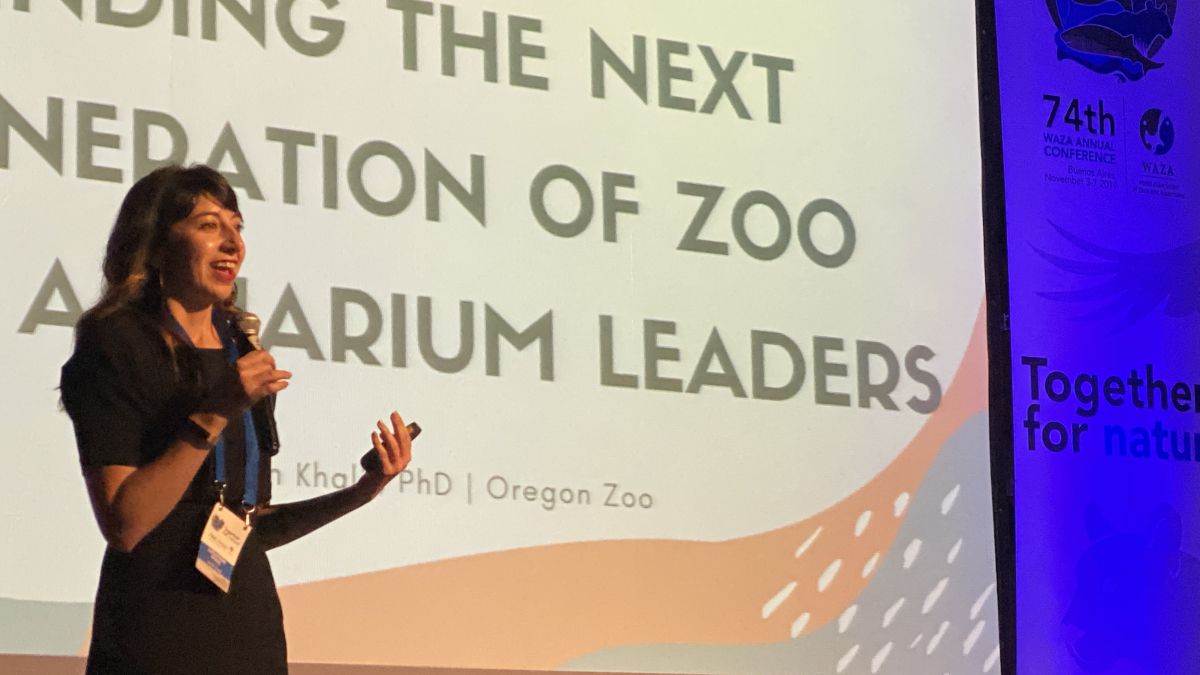
Next Up: Shattering Assumptions About the Rules of Conservation Education with Dr. Kathayoon Khalil | S1 Ep 5
Dr. Kathayoon Khalil shares how educators and conservationists can inspire action, build partnerships, and reimagine how we connect with each other and the planet.
Image
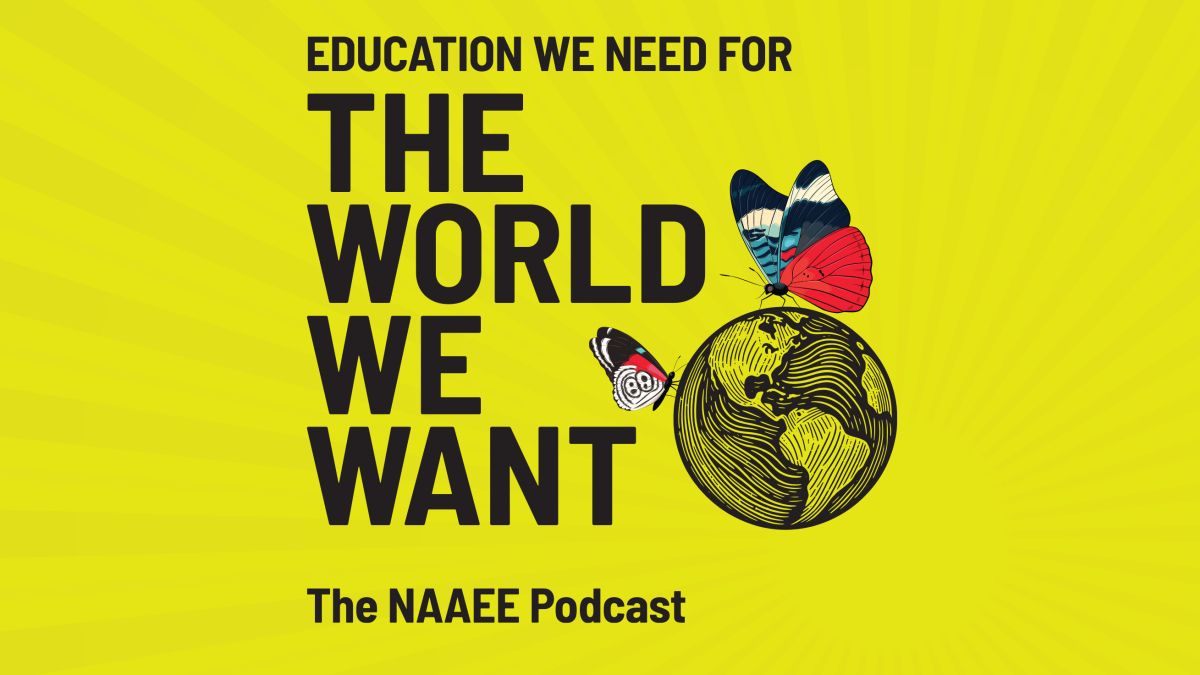
Imagine a world where communities thrive, curiosity sparks change, and hope fuels action. Welcome to The World We Want, the NAAEE podcast that's bringing a better future to life, one inspiring story at a time. Join us as we chat with people across continents and cultures who care about education and the environment—the trailblazers, visionary leaders, and everyday heroes making a difference.
Listen Now
Enjoyed This Episode?
Share your thoughts, takeaways, or resources you'd love to see featured by logging in or creating a free eePRO account.
